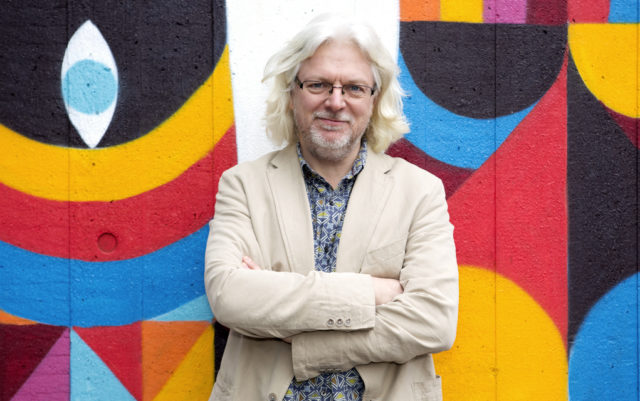
The Boulder Philharmonic ends a spectacular season Saturday with the spectacular orchestral fireworks of Respighi’s Pines of Rome.
The 2016–17 season saw sell-out performances, a trip to Washington D.C.’s Kennedy Center and national recognition at the Shift Festival of American Orchestras. “We’re celebrating a successful season, and one that’s been historic for us,” says Michael Butterman, music director. “I wanted to have an exclamation point at the end of the season.”
Respighi’s showpiece is the culmination of an almost all-Italian program. Everything on the concert is either by an Italian, based on Italian music or — in the case of the world premiere of a concerto by Welsh composer Stephen Goss — inspired by an Italian novel.
Goss’s piece was written for guitarist Nicolò Spera and the Phil’s concertmaster, violinist Charles Wetherbee, both CU faculty members. His Double Concerto for violin, guitar, strings and percussion is titled Invisible Cities, which is also a short novel by Italo Calvino that is a favorite of Spera.
“It is one of the visionary books in the whole landscape of Italian literature,” Spera says. “You can put it right next to Dante’s Divina Commedia (Divine comedy).”
The novel imagines conversations between Marco Polo and the Chinese emperor Kublai Khan. Polo describes the cities of the Chinese Empire that he has visited, but that the Emperor has never seen. In the course of the novel, it turns out that Polo is actually describing his home city of Venice.
Goss says that his score is both inspired by scenes that Polo describes and built on the intricate structure of the novel. The nine chapters of the novel are reflected in nine sections of the concerto. The book’s division into 55 descriptive poems and intervening prose conversations is reflected in an alternation between five titled movements and four dialogues between guitar and violin.
“Each movement has its own world, so they’re all quite separate in terms of mood and character and atmosphere,” Goss says. “Between each of the five movements there are dialogues with just the two soloists. The violin part glances toward Italy, because that’s the part that represents Marco Polo. The guitar part is more Kublai Khan and tends to be a little more eastern in flavor.”
Spera is looking forward to the premiere. “It’s very exciting because the performers, Charles and I and the orchestra, will discover the piece at almost the same moment as the audience,” he says.
“I think it’s going to be a beautiful experience. There are some moments in my part when I get entranced, deeply moved by how powerful and beautiful this piece can be.”
The program opens with Igor Stravinsky’s Monumentum pro Gesualdo, an arrangement of renaissance madrigals by a composer known both for his adventurous harmonies and for murdering his wife and her lover.
“Gesualdo is very much forward thinking in terms of his harmonic language,” Butterman says. “I think that struck a chord with Stravinsky, who was interested in viewing work from the past through the prism of his 20th-century ears. There are tart chords that are Stravinskian, but I think people will find it very listenable.”
Stravinsky’s re-interpretation of Renaissance madrigals will be followed by Luciano Berio’s re-interpretation of a classical-era piece, Four Original Versions of Boccherini’s Return of the Nightwatch from Madrid. Originally composed for string quintet, Boccherini’s catchy march was used by the composer in four different versions, which are combined and re-orchestrated for large orchestra in Berio’s arrangement.
After the Goss premiere and intermission the program continues with Verdi’s Overture to Nabucco and an early string work by Puccini, The Chrysanthemums. “It seemed impossible to trace the evolution of Italian music, if that’s what we’re doing, without opera and the contributions of Verdi and Puccini,” Butterman says. “For any orchestra that doesn’t play a lot of opera it’s nice to be able to encounter these wonderful and important composers.”
The concert will close with The Pines of Rome, which, Butterman points out, includes extremes of orchestral sound. “It has everything from ear-splitting fortissimos to incredibly delicate and gentle moments,” he says.
Among the gentle moments is the section titled “The Pines of the Janiculum,” a quiet nocturne that includes delicate solos from the clarinet and other woodwinds and ends with a recording of a nightingale — probably the first recording of natural sounds incorporated into live performance.
That moment of reflection is followed immediately by “The Pines of the Appian Way,” depicting the march of Roman legions along the broad highway leading into Rome. As the legions approach, Respighi calls for Buccine, the circular horns of the Roman military.
Sadly, Buccine no longer exist, so those parts have to be played by antiphonal choirs of flugelhorns, bringing the piece, the concert, and the season, to a thunderous ending.
On the Bill: Boulder Philharmonic Season Finale. 7:30 p.m. Saturday, April 22, Macky Auditorium, 1595 Pleasant St., Boulder. Tickets: 303-449-1343, boulderphil.org.














